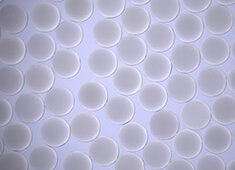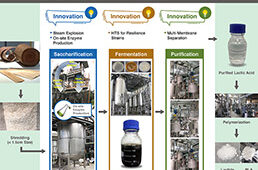The researchers were able to make a material that consists of 99.99% air by designing the 0.01% solid at the nanometer, micron and millimeter scales. |
A
team of researchers from UC Irvine, HRL Laboratories and the California
Institute of Technology have developed the world’s lightest
material—with a density of 0.9 mg/cc—about 100 times lighter than
Styrofoam. Their findings appear in the Nov. 18 issue of Science.
The
new material redefines the limits of lightweight materials because of
its unique “micro-lattice” cellular architecture. The researchers were
able to make a material that consists of 99.99% air by designing the
0.01% solid at the nanometer, micron and millimeter scales.
“The trick
is to fabricate a lattice of interconnected hollow tubes with a wall
thickness 1,000 times thinner than a human hair,” said lead author Dr.
Tobias Schaedler of HRL.
The
material’s architecture allows unprecedented mechanical behavior for a
metal, including complete recovery from compression exceeding 50% strain
and extraordinarily high energy absorption.
“Materials
actually get stronger as the dimensions are reduced to the nanoscale,”
explained UCI mechanical and aerospace engineer Lorenzo Valdevit, UCI’s
principal investigator on the project. “Combine this with the
possibility of tailoring the architecture of the micro-lattice and you
have a unique cellular material.”
Developed
for the Defense Advanced Research Projects Agency, the novel material
could be used for battery electrodes and acoustic, vibration or shock
energy absorption.
William
Carter, manager of the architected materials group at HRL, compared the
new material to larger, more familiar edifices: “Modern buildings,
exemplified by the Eiffel Tower or the Golden Gate Bridge, are
incredibly light and weight-efficient by virtue of their architecture.
We are revolutionizing lightweight materials by bringing this concept to
the nano and micro scales.”





